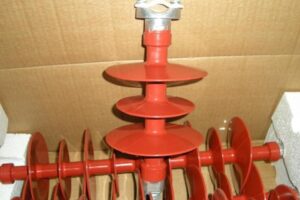Power pole insulators are an important component of electrical transmission and distribution systems, as they help to prevent the transmission of electricity from power lines to the ground. There are two main types of power pole insulators: SMC (sheet molding compound) and BMC (bulk molding compound). Both types of insulators have their own unique manufacturing process and characteristics, which will be discussed in detail in this essay.

Power Pole Insulator
SMC power pole insulators are made from a composite material consisting of glass fibers, resin, and fillers. The manufacturing process for SMC insulators begins with the preparation of the raw materials. Glass fibers are chopped into small pieces and mixed with resin and fillers to form a slurry. The slurry is then placed into a mold and subjected to high pressure and heat to cure the composite material.
One of the advantages of SMC insulators is that they can be molded into a variety of shapes and sizes, which makes them suitable for use in a wide range of applications. They are also very durable and can withstand harsh environmental conditions, such as extreme temperatures and weather conditions.
BMC power pole insulators are also made from a composite material, but they are composed of different types of resin and fillers. The manufacturing process for BMC insulators begins with the preparation of the raw materials, which are mixed together to form a dough-like consistency. The dough is then placed into a mold and subjected to high pressure and heat to cure the composite material.
One of the advantages of BMC insulators is that they have a higher electrical resistance compared to SMC insulators, which makes them suitable for use in high-voltage applications. They are also more resistant to cracking and breaking, which makes them more durable than SMC insulators.
Both SMC and BMC power pole insulators have their own unique characteristics and are suitable for different applications. SMC insulators are more flexible and can be molded into a variety of shapes and sizes, which makes them suitable for use in a wide range of applications. On the other hand, BMC insulators have a higher electrical resistance and are more resistant to cracking and breaking, which makes them suitable for use in high-voltage applications.
Unicomposite’s SMC/BMC Products
We supply various fiberglass products made from SMC and BMC materials: enclosures, insulators, boxes, nuts/bolts, seats/chairs, various parts for machinery and electrical, etc.




























